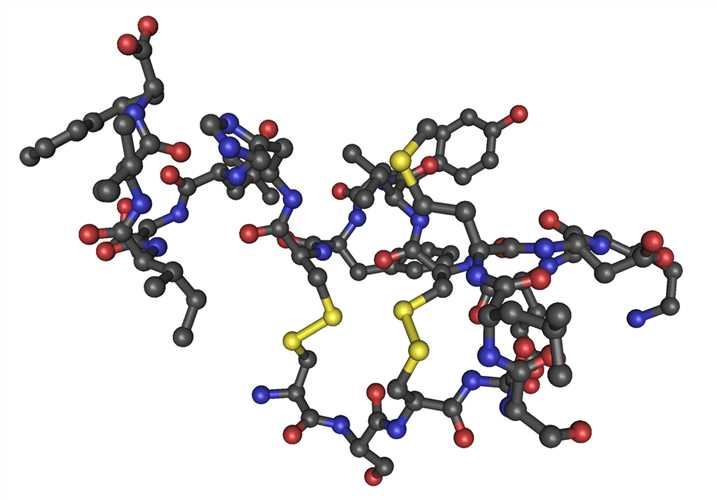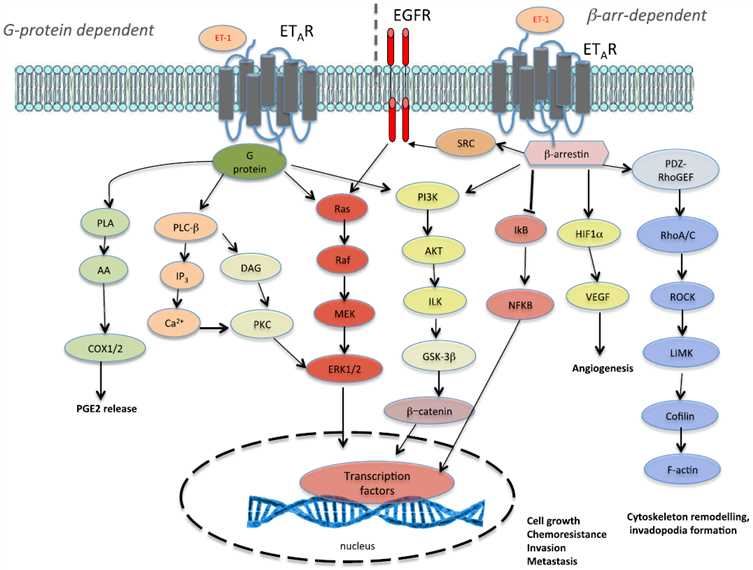The endothelin-1 type A receptor (ETaR) belongs to the endothelin receptor group of G-protein-coupled receptors (GPCRs) 1 family that also harbors ETB. This receptor is primarily located at the vascular smooth muscle where it plays a role in cell proliferation and vasoconstriction. There’re several defined diseases associated with ETaR, for example, mandibulofacial dysostosis with alopecia, migraine with or without aura. As a well-recognized expert in the antibody field, Creative Biolabs has rich experience in developing and characterizing various different antibody products, including agonistic autoantibodies. In particular, we offer one-stop, customer-oriented anti-ETaR antibody development services that meet all clients’ sensitivity needs and quality requirements.
The endothelin family is composed of three isoforms: endothelin-1 (ET-1), ET-2, and ET-3. ET-1 is the principal isoform and a 21-amino-acid vasoactive peptide that has been considered as a very potent vasoconstrictor and growth promoter. The physiological effects of this ET system include the regulation of vascular tone, cell proliferation, and renal function. ET exerts its functions through two kinds of endothelin receptors: type A (ETaR) and type B (ETbR). Both receptors are GPCRs, sharing homology with the rhodopsin family. ETaR is a 427-amino-acid protein of the rhodopsin-like seven-transmembrane receptor family. It binds ET-1 and ET-2 preferentially and can be variably modified by N-linked glycoproteins, phosphorylation and palmitoylation. Developmentally, ETaR is expressed by cranial neural crest cell lines and leads to facial morphogenesis. In the human fetal olfactory epithelium cell line, this receptor can increase the secretion of gonadotropin-releasing hormone.
 Fig.1 Endothelin.
Fig.1 Endothelin.
ET-1R can regulate cell proliferation, survival, motility, angiogenesis, cytoskeletal changes, and drug resistance. Antibodies against ETaR are among a number of autoantibodies that are found to be correlated with allograft dysfunction. Anti-ETaR antibodies have been shown to activate their target receptors and affect signaling pathways. Multiple single center reports have displayed a connection between the presence of these antibodies and acute/chronic rejection and graft loss in heart, kidney, lung, liver, and composite tissue transplantations. Understanding how antibodies activating GPCRs influence transplantation outcomes would result in direct clinical implications for pre-evaluation of transplant candidates and the post-transplant care of organ recipients. In order to bridge the gap within transplantation biology, Creative Biolabs focuses on the knowledge of Anti-ETaR antibodies in different diseases and provide custom development services of agonistic autoantibodies.
In addition to this, the advent of targeted therapeutics in cancers has begun to detect novel agents and ETaR represents a class of highly druggable molecules in human cancer. It is aberrantly expressed in various malignancies, potentially being a prognostic factor. The ETaR activation by ligand stimulation initiates signaling cascades motivating downstream effectors, allowing precise regulation over multiple signaling pathways. In the tumor growth and progression, ET-1R is behalf of a crucial target that has been exploited for ET-1R-mediated therapeutics. Notably, our comprehensive anti-ETaR antibody development services have been established and can be used for therapeutic applications with high efficacy. As a preferred supplier, we’re pleased to cooperate with global scientists to address more challenging agonistic autoantibodies projects.
 Fig.2 Signaling pathways activated by ET-1 in cancer. (Rosanò, 2016)
Fig.2 Signaling pathways activated by ET-1 in cancer. (Rosanò, 2016)
Autoantibodies could attack the body's healthy cells, tissues, and organs, causing inflammation and damage. On the other hand, they may also help the body to destroy cancers and eliminate waste products, performing as a nonpathological role. Accordingly, the function of autoantibodies in the normal immune system is still a subject of scientific research. With an impressive performance in the antibody market, Creative Biolabs provides long-standing expertise in the discovery, production, and development of agonistic autoantibodies, as well as other types of biologics. We’re committed to delivering high-quality anti-ETaR antibody products and services based on industry-leading skills and well-established reputation. For more information, please feel free to contact us.
Reference
All listed services and products are For Research Use Only. Do Not use in any diagnostic or therapeutic applications.